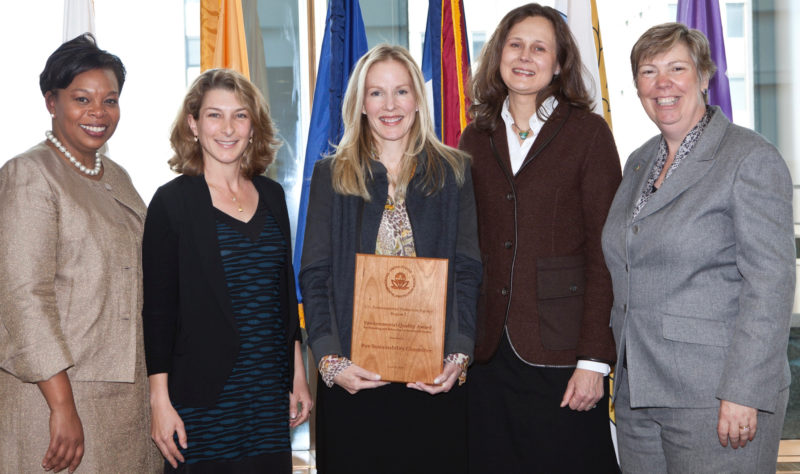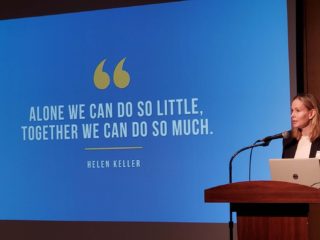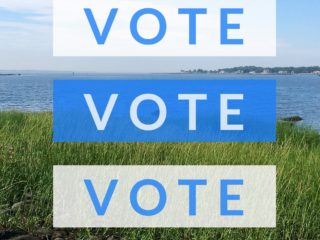So you’ve made changes in your personal life and you’d like to do more. You can. I did, in 2011, by spearheading and passing a plastic bag ban in my hometown. It was the first of its kind in Westchester County, NY and the third in New York State.
How did I do it? It wasn’t a piece of cake, but anyone who understands the issues, stays organized, and passionately pursues their goal can accomplish it.
Let me walk you through the steps—but first, some background.
Table of Contents
Background

It was 2010, and I’d just formed the Rye Sustainability Committee to create a Rye Sustainability Plan. Tossing around potential projects at one of the first meetings, someone mentioned how needlessly wasteful plastic bags were and how some communities had actually banned them.
Curious, I did a little online research and discovered that the first ban in the U.S. was in 2007 in San Francisco. Bans in California municipalities had spread, but as of 2010, only one town on the East Coast, Westport, CT, had successfully passed a Reusable Bag ordinance (aka plastic bag ban).
Reading an article about the Westport legislation, I noted the name of one of the authors, Westport Representative Jonathan Cunitz, and sent him an email, asking to talk. To my delight, Jonathan responded immediately and generously offered to meet and share his success story.
You Can’t Do This on Your Own (Part 1)
What do I remember from that first, key meeting with Jonathan Cunitz? A few points stood out in my mind as he helped us kick off what we called Rye Sustainability’s Reusable Bag Initiative (RBI).
The Team
- You need a core team—3 or 4 people—who work well together. (I’ll call it the Reusable Bag Initiative (RBI) team.)
- Pick a leader who’ll be comfortable communicating with government officials, business owners, and the community, and who will be able to delegate tasks.
Set a Timeline
We planned for 8 – 10 months, but if there’s already support in your community, you may not need as much time. If you find resistance, you may need to expand the initiative to address all concerns.
Remember, it’s not a race. You want to do this right.
Be Organized
Keep notes, delegate tasks, set meetings.
Most importantly …
Don’t think you can do this on your own, or with just your core team. Transforming the culture of a community requires buy-in and support from all groups within the community. (See Lesson 4, below.)
It’s important to step outside your passionate RBI group and understand how others view the issue. Are they fearful, dismissive, outright hostile? How will you help them change their minds?
Know Your Facts
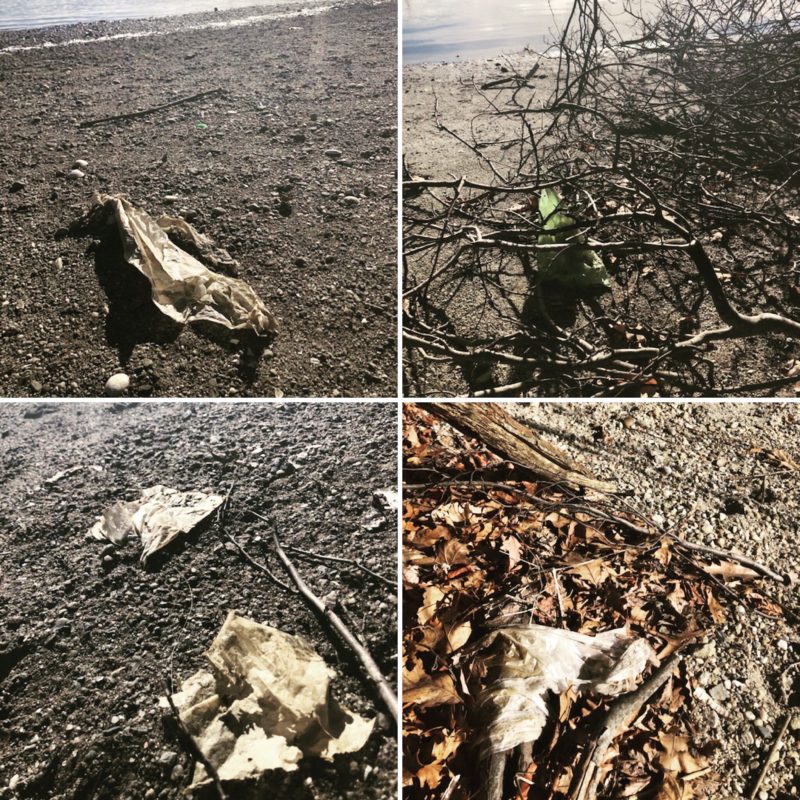
You don’t have to be an expert on plastic bags and bag legislation, but you and your RBI team members should be well versed on a number of issues.
I list below general subject areas that you need to cover and a few suggested links, but it’s important to do periodic searches to get the most recent news and facts. See also the Additional Resources section, below, and Green That Life’s Best Environmental Books for a list of books related to waste reduction and how to environmental activism.
Facts about Plastic and Plastic Bags
- What is plastic? A good summary of the types of plastic can be found here.
- Timeline of plastic bag usage. A persuasive case to make is that for most of human history people have relied on more durable alternatives to plastic bags!
- Stats on current plastic bag usage. See UC Santa Barbara’s research for excellent graphics on global plastic production.
- Stats on plastic bag litter. UC Santa Barbara’s study of plastic waste found in our oceans is a good resource. I also like National Geographic’s fast facts about plastic pollution.
- How single-use disposables adversely impact the environment and wildlife, particularly marine wildlife.
- Clean-up costs for plastic litter, particularly in your community.
- Facts and figures about plastic recycling rates and waste disposal. I recommend EPA’s annual Fact Sheet on the topic.
- An alarming, but powerful, statistic to remember is that only 9% of all plastic is recycled. The rest sits in landfills or pollutes the environment.
- The declining market for recycled plastic bag use, particularly with China’s recent ban on U.S. plastic recyclables with its National Sword Policy.
- The challenges of recycling as a tool for waste reduction.
- The connection between fossil fuels and plastics. It’s important to demonstrate the link between plastic production/usage and climate change.
Facts about Plastic Bag Bans
- Similar legislation in other communities and states.
- Types of legislation:
- Ban only on plastic carryout bags. This is Rye’s law. While I recommend an RBI group push for the plastic bag ban/paper bag fee model, read below about why this version was used in Rye.
- Fee on both plastic and paper carryout bags.
- Plastic bag ban and fee on paper carryout bags.
- Surveys of the effectiveness of a community’s plastic bag legislation.
- Preemption Law. What is it? It’s a law passed by a state governing body that controls and prohibits the passage of a local law – in this case, plastic bag regulation. This has been a problem in a number of states, and it’s important to check if a plastic bag preemption law has been passed in your state.
A Note About Rye’s Law
Every now and then people ask me, “Rye only has a ban and no fee. Why? Shouldn’t you go back and try for the fee?”
I agree that the plastic bag ban/paper bag fee combo is the most effective legislation. But at the time I was pushing for change, no other community in Westchester County had tried or even knew what a plastic bag ban was. There were only a handful of these laws on the East Coast—and not that many across the country.
Also, my town’s culture is quite traditional. There was no way we would’ve been successful if we’d demanded ban/fee legislation or nothing else. Not only were we successful in passing legislation, we also did all the groundwork beforehand to educate the community and raise awareness. The law was just another step in changing the mindset of the community. That’s why the vote by City Council was unanimous.
Should I now push to amend and update the Rye law? In the eight years since Rye’s law has passed, there has been a heightened awareness in Rye about the need to rethink and reuse. The community takes pride in its role as a model of sustainability. A cultural transformation has taken and continues to take place, and the need to slap on more plastic bag legislation—in Rye—isn’t of paramount importance.
Most importantly, NY State has now passed its own statewide law. More needs to be done with this legislation, but it’s a start to moving the entire state towards reducing single-use plastic consumption.
I’ve helped numerous communities pass their own legislation. I applaud those communities that have been able to leverage Rye’s success and build upon it by enacting more comprehensive laws. I’m sure all this activity was a major factor in prompting NY State to pass its own law.
Know Your Community — Stakeholder Groups
Ideally, the members in your RBI group have ties with one or more of these important stakeholder groups. You need, first, to understand what these groups are most concerned about, and then, determine a way to reassure, build awareness, and finally enlist their support.
I list here what I found to be the main challenges and what was done to mitigate them. You may end up with a different list, but this should get you started.
Merchants
Understand the Challenges: Most were supportive, but a few—family-owned delis, in particular—had these concerns:
- Plastic bags are cheaper than paper. What if the ban drives customers to use more paper? Costs will increase.
- What if shoppers, annoyed that there are no plastic bags, decide to shop in non-ban towns?
- How will my store contain “messy” food (e.g., soup, deli meat)?
Gather Information:
- Call food establishments/retail stores in towns that have passed bag bans. Compile a list of questions to ask related to the merchants’ concerns. Summarize the results of your interviews for merchants.
- I searched for retail/food establishments in “bag” towns (i.e., towns that have passed plastic bag bans) and picked up the phone. I asked to speak to the manager or owner and then interviewed them.
- Possible questions to ask merchants in “bag” towns:
- General reaction to the ordinance?
- Did you oppose the ordinance?
- Has your business suffered financially as a result of the ordinance?
- Any customer complaints?
- Aware of any other merchant complaints?
- Alternatives to plastic?
- Anything the government could’ve done better to ease the transition?
- Meet with the local chamber of commerce. Note their concerns.
Residents
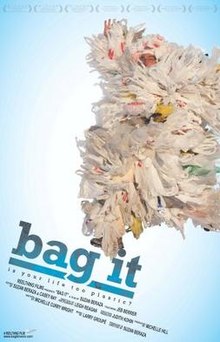
Build Awareness
- Organize a screening of a documentary related to plastic bag or single-use disposables, preferably with a discussion panel afterward. Rye Sustainability and a local school organized a screening of the documentary Bag It as part of its ongoing Green Screen film series. The partnership with the school helped expand the audience and we had a big turnout. Gather email addresses of attendees.
- Spread the word about plastic litter and how the ordinance will help solve this enormous environmental problem.
- Solicit help from environmental and civic organizations.
Government/Elected Officials
Gather Information:
- Identify an elected official who will sponsor the initiative and proposed law.
- Meet with as many elected representatives as possible. Note their concerns and promise to follow up.
- Meet with administrators, especially those who will be in charge of enforcement. Note concerns/follow up.
For those common questions and concerns about a plastic bag ban, read my suggested answers here.
You Can’t Do This on Your Own (Part 2)
Now that you’re armed with the facts and have identified the key groups in your community, it’s time to take action and enlist their support. You and your team can’t get this done without them.
Here are some action items by group.
Merchants
- First, begin with a merchant pledge. Our group visited as many businesses as possible, asking owners/managers to sign a general pledge of support to eliminate their plastic bag inventory.
- I got the list of most businesses from our local chamber of commerce and made a spreadsheet so we could divide the list among the RBI group.
- Start with the most supportive businesses. Their signatures can help nudge more reluctant businesses to sign.
- Visit in person! It’s much more difficult to persuade and reassure by email or over the phone.
- We ended up getting over 60% of the businesses to sign, and none refused to sign.
- Second, identify supportive merchants. Ask them to support you by writing letters to the city government, communicating their endorsement to other merchants, and by attending City Council meetings to voice support.
Residents
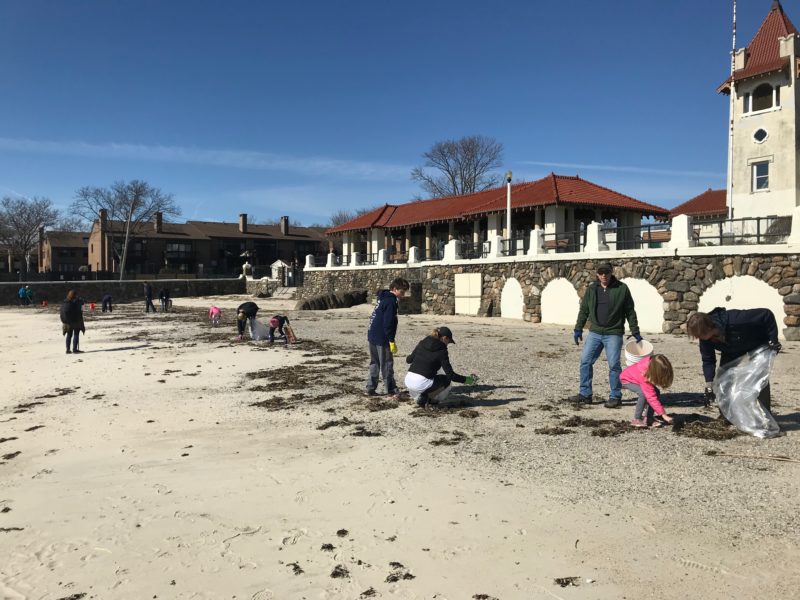
- Send group and personal emails encouraging residents to write letters of support to elected officials for a plastic bag ban.
- Provide examples, but encourage people to write their own. A hundred personal letters to the mayor carry far more weight than 500 form letters.
Government/Elected Officials
- Continue to meet with as many elected and municipal officials as possible. If they can’t meet, call or email. Address all their concerns and follow up with the answers.
- Ask one or more to sponsor the proposed legislation.
- Contact city officials in “bag towns” to learn how they overcame any potential obstacles.
- Update city officials periodically on your progress. Highlight how other communities have benefited from the new law. Provide specific examples.
- Make it easy for the sponsor of the proposed law. I drafted the law using, mainly, Westport’s model. The town attorney vetted and approved it, but it saved elected officials a lot of time.
Civic Groups
Local groups. Support from local groups is key. Some examples of groups to target and ask for their support: nature centers, chambers of commerce, PTOs, garden clubs, student groups, faith-based organizations.
Role of outside groups. Should you enlist the help of national and/or regional plastic bag ban support groups to help with “boots on the ground” advocacy of the three main community groups? We discussed this and ultimately decided against it. I believed it was important that this initiative be one that was formed and led by Rye residents who knew their community.
That’s not to say we didn’t welcome representatives from outside groups speaking at public hearings or assisting us with gathering facts. I am indebted to them for their assistance!
Experts
This is my loose term for people who’ve been successful in passing legislation in their own towns. This group includes community activists, elected officials, merchants, or people like me—a resident, passionate about keeping her town beautiful for all—who have successfully spearheaded plastic bag ban initiatives. Their help and support were critical.
How do you create this group? I researched towns that were similar to my own, identified the key players and contacted them. Most responded and were only too happy to help. Remember, we’re in this together.
Opponents/Challenges
You’ve now built your network of supporters, but it’s important to be aware of potential obstacles and groups that could try to derail your initiative.
In Your Community
The key is to understand each group’s motivation, note their concerns and find answers. In most cases, their lack of support isn’t malicious. It’s simply a lack of understanding of the issues and the goals of your initiative.
Outside of Your Community
Plastic industry groups and trade associations can throw a wrench in your plans through intimidation or outright lawsuits. It’s important to know the main groups: American Progressive Bag Alliance, American Chemistry Council, to name a couple.
Here are some of their main arguments.
Recycling. Many of these organizations promote recycling as a way to assuage consumer guilt for the use of single-use plastics.
Possible responses:
- While we should continue to recycle, the most important goal is to reduce consumption from the start of single-use disposables.
- Recycling rates for plastics remain very low.
- The current ban by China on importing U.S. recyclables has put significant pressure on the recyclables market. The likelihood that recyclables will instead be tossed in landfills or incinerated is a real possibility.
Economic. Another argument is that local businesses will suffer if a plastic bag ban is passed.
Possible responses:
- To date, there is no persuasive evidence showing that a local economy or businesses has suffered due to the passage of a plastic bag ban.
- In fact, plastic bag laws have been passed in a large number of municipalities, states and countries, all with varying sizes, demographics, and levels of wealth.
Education is the solution; not legislation.
Possible responses:
- Behavioral change experts have noted that when consumers lack the motivation to change, even if they’re shown how, regulation is needed to give them a nudge. Think seat-belt laws!
- Education and regulation aren’t mutually exclusive. You can do both. Education is just one part of a comprehensive campaign to change consumer behavior.
Advocate for the Law
The big day has arrived and it’s time for your local legislative body to consider the proposed legislation. It’s time to rally supporters and speak out at the public hearing.
Prep for the Public Hearing
This is key: Pack the audience! It’s critical to have a large, supportive group present at the hearing. Ask the following groups of people to attend, and ask them to write letters/emails. Ask those who will be willing to speak at the public hearing. Reach out to these groups:
- Residents
- Students
- Merchants from Rye and from “bag towns”
- City officials from other communities
- Environmental organizations—local and beyond
- Elected officials—county/state
Public Hearing Presentation
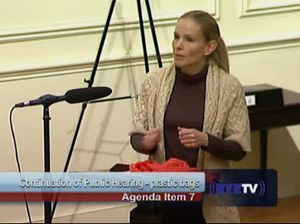
Typically members of the public are allowed only a few minutes to speak. As chair of a municipal committee (Rye Sustainability), I was given more time to state our case. If your group has limited time, consider breaking up the sections in the presentation and dividing them among a number of presenters.
- Review other hearing presentations
- General format should include:
- Background information on bag facts; poor recycling rates
- Fact that single-use disposables are economically and environmentally costly
- Photos of plastic bag litter in your community and beyond
- Best practices: what other communities have done and their success
- Stats on local merchant support—which categories (ideally, food/retail) support the ordinance
- The committee’s public awareness initiatives
- Fact that enforcement issues are negligible (i.e., the new law will not create extra work for city staff)
The Law Passed! Now What?
Congratulations! Enjoy the victory!
You still have a bit more work to do … Some or most can be handled by your town government. As Rye Sustainability was a municipal committee, much of this was completed by my group.
- Prepare Frequently Asked Questions for the government website. Also, distribute via your networks. Ask supportive organizations and the chamber of commerce to circulate.
- Prepare and distribute packets that include the new law, a summary of the law, and FAQs. The chamber of commerce emailed the packets to their members. We also hand-delivered the packets to most of the delis and stores that used plastic bags. That way we could answer any questions they might have.
- Prepare and distribute visual descriptions detailing the new plastic bag ban. We had posters prepared for shopkeepers to display and tent cards to place next to cash registers.
The Law Didn’t Pass? Now What?
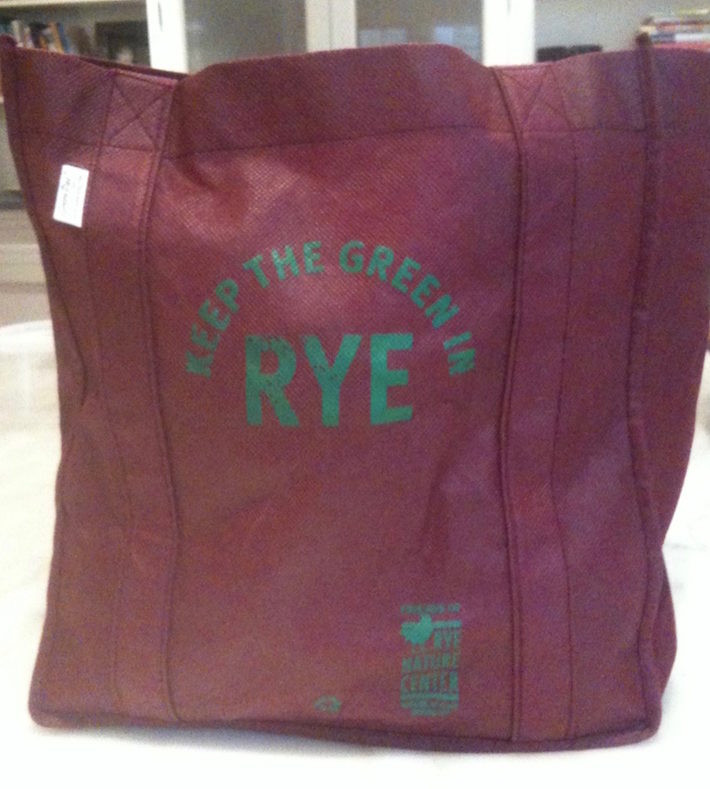
You didn’t get what you want. Either the law was passed with restrictions. Or it didn’t pass at all. What do you do now?
Remember the Big Picture
Ultimately, the goal isn’t (or shouldn’t be) the plastic bag ban. The goal should be to change mindsets in your community. It should be to draw attention to the unnecessary environmental waste produced by single-use disposable plastic. And you’ve helped do that if you and your team have accomplished the six steps, above. Just because you didn’t reach Step 7 doesn’t mean you haven’t made a significant contribution to raising awareness in your community.
Wait… and Try Again
I know a number of groups that initially failed to get what they wanted and kept at it until they did. Again, through the process of continuing advocacy against single-use disposables, your group will raise awareness in your community. Your network of supporters will grow, legislative bodies can become more receptive, and you can try again to get what you want.
Does Your Community Really Need a Plastic Bag Ban?
Or, if the resulting legislation isn’t all that you wanted, do you really need to try again?
I see plastic bag legislation as one of many steps towards changing a community’s mindset. It’s certainly an effective one, but it’s not necessarily the end-goal. Outreach, education and awareness campaigns must accompany legislation—and if these components aren’t robust, jamming a law through without building support could result in hostility and resistance.
If you and your RBI group see outright resistance to plastic bag legislation, it’s still worthwhile to continue with outreach. Also, take a look at what your county or state legislatures are doing. They may be working on plastic bag legislation and you can support their efforts.
Additional Resources
Reading Material
Plastic: A Toxic Love Story, by Susan Freinkel. My favorite book on the subject. Clear, comprehensive, and fact-based.
National Geographic’s recent cover story on plastic pollution is a must-read.
The New York Times’ article on recycling explains how China’s recent ban on U.S. recyclables is prompting many cities to stop recycling.
My Material
11/16/11 Video: Public Hearing on a Proposed Retail Checkout Bag Ordinance (Item 7)
12/7/11 Video: Continuation of Public Hearing and City Council Vote (Item 7)

